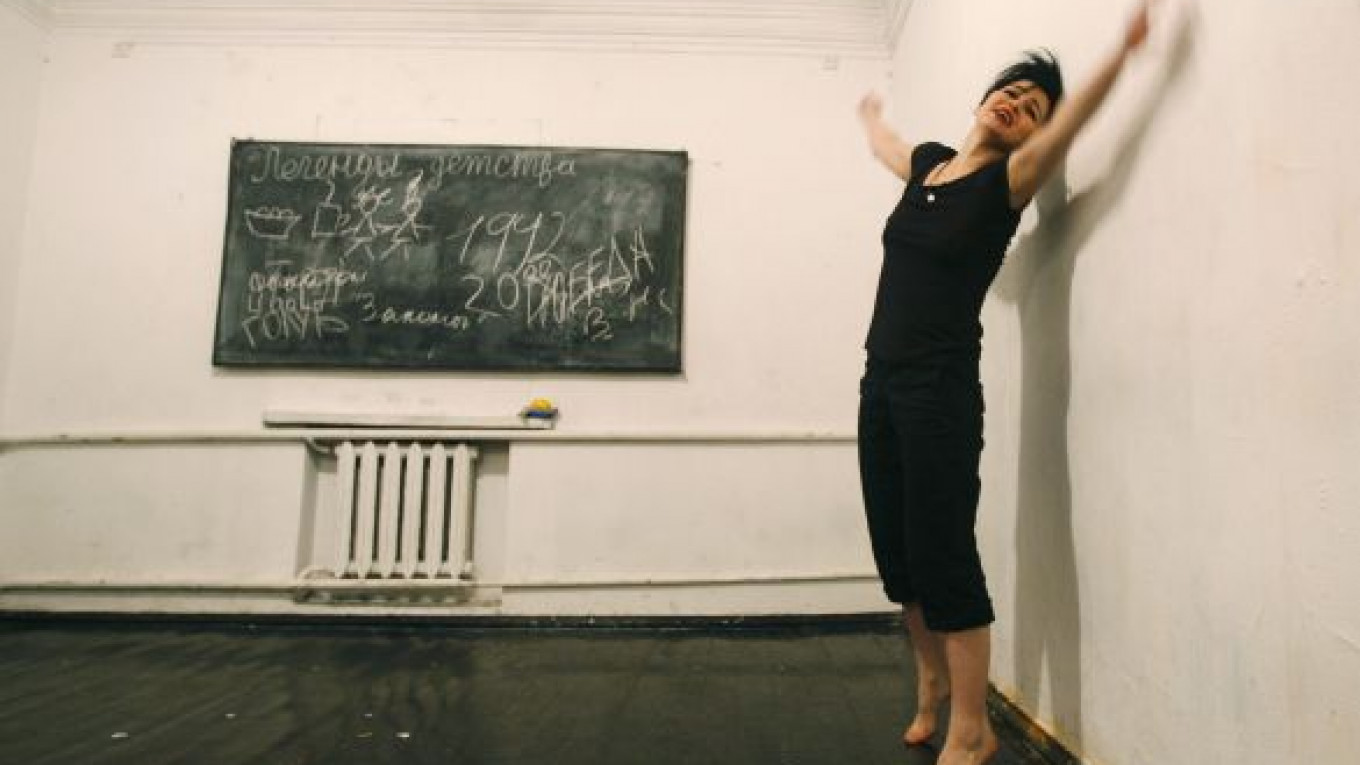MINSK — Deep snow smothered the noise. Only fresh footprints leading to the tumbledown house in a suburb of the Belarussian capital Minsk betrayed life behind its boarded-up windows.
Inside, actors strutted and pounced barefoot on black floorboards while the tiny audience shared the makeshift stage for the performance.
The converted house that is home to the Belarus Free Theater is a far cry from London’s Soho, where its actors last performed.
With its close-to-the-edge repertoire and refusal to be censored by a government for which free expression is anathema, the theater company has been driven underground — and abroad — since its inception in 2005.
On Monday, the theater’s husband and wife founders, Nikolai Khalezin and Natalia Koliada, were caught up in a violent police crackdown on dissenters following the re-election of Soviet-style strongman Alexander Lukashenko to a fourth term.
“We are at the KGB,” Koliada said in a text message to friends late Sunday after she was arrested with other activists during a protest of some 10,000 in snow-bound Minsk.
Khalezin disappeared, and blog posts said he had been arrested after neighbors reported seeing security officers trying to break into the family home. It appeared he had gone to ground.
At least seven election candidates and hundreds of demonstrators were being held on Monday, including journalists and human rights activists.
“They [the KGB] are cleansing the city,” Koliada said shortly after her release after 14 hours in detention.
Lukashenko, a mustachioed former state farm director, has ruled the country of 10 million people on Russia’s western border since 1994, three years after he defied the rest of the Belarussian parliament to vote against a treaty that ended the Soviet Union.
Official results on Monday gave him almost 80 percent of the vote. International monitors criticized the vote as flawed. In an interview over coffee before Saturday’s performance, Khalezin had already predicted protests.
“Now, there’s momentum,” he said. “I don’t know if it’s enough to get rid of the regime. But everyone wants change.”
Lukashenko dismissed such an idea on Monday, saying, “There will be no revolution or criminality in Belarus.”
Thousands marched on Sunday on Independence Square under dancing Christmas lights, chanting “Out!” and “Long live Belarus!” They were beaten and scattered by riot police.
The violence abruptly lowered the curtain on Lukashenko’s own performance, in which he offered flickers of liberalization to a European Union looking to exploit a fallout between Minsk and Moscow.
Opposition candidates were granted airtime, and activists were allowed to canvass voters.
But then the election ended and police beat opposition challenger Vladimir Neklyayev and later arrested him in his hospital bed. They chased demonstrators into the subway.
It was a dramatic end to a day of theater, which saw Lukashenko’s 6-year-old son cast his ballot and the president scoff at threats of opposition protests. “Don’t worry,” he said, “there will be nobody on the square.”
Saturday’s performance of the play “Zone of Silence” was laced with criticism of the government. A succession of monologues in the first act told of disturbing childhoods with tragic ends, and of a paranoid regime.
“First and foremost, we take a cultural position,” Khalezin said. “If you have only a political position, no one’s going to watch. No one wants to hear it. But if we’re from the last dictatorship in Europe, should we say we’re not? We are!”
The label is not his own.
The administration of former U.S. President George W. Bush branded Belarus Europe’s last dictatorship over Lukashenko’s record of jailing opponents and muzzling independent media.
Touring abroad, the Free Theater has gathered a list of celebrity supporters that reads like a roll call of the great and the good of the British theater establishment, including playwrights Tom Stoppard and the late Harold Pinter as well as actor Ian McKellen.
At home, performances are announced just a few hours in advance, by text message or blog post. The theater has several venues it moves between.
Police stormed a show in Minsk in 2007 and arrested the entire cast and audience shortly after British rock star Mick Jagger recorded a tribute to the theater company and a call for democracy.
But the theater still buzzes with optimism.
Lukashenko’s rule has been underpinned by Russian subsidies — cheap oil and gas — that have helped the Belarussian economy to defy gravity.
But even Moscow has grown weary of its unpredictable partner.
The subsidies are drying up, and if the strength of Sunday’s protests is any indication, Lukashenko could face a rougher ride over his next five years in power.
The election “is the beginning of the end,” Khalezin said. “Just quite how it will end, no one knows.”
A Message from The Moscow Times:
Dear readers,
We are facing unprecedented challenges. Russia's Prosecutor General's Office has designated The Moscow Times as an "undesirable" organization, criminalizing our work and putting our staff at risk of prosecution. This follows our earlier unjust labeling as a "foreign agent."
These actions are direct attempts to silence independent journalism in Russia. The authorities claim our work "discredits the decisions of the Russian leadership." We see things differently: we strive to provide accurate, unbiased reporting on Russia.
We, the journalists of The Moscow Times, refuse to be silenced. But to continue our work, we need your help.
Your support, no matter how small, makes a world of difference. If you can, please support us monthly starting from just $2. It's quick to set up, and every contribution makes a significant impact.
By supporting The Moscow Times, you're defending open, independent journalism in the face of repression. Thank you for standing with us.
Remind me later.






